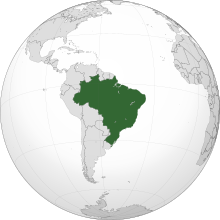
Back تاريخ اليهود في البرازيل Arabic Braziliya yəhudiləri Azerbaijani برزیل یهودیلری AZB Geschichte der Juden in Brasilien German Historia de los judíos en Brasil Spanish تاریخ یهودیان در برزیل Persian Histoire des Juifs au Brésil French יהדות ברזיל HE História dos judeus no Brasil Portuguese Евреи в Бразилии Russian
Judeus brasileiros יְהוּדִים ברזילאים | |
|---|---|
 The Location of Brazil in South America | |
| Total population | |
| 107,329[1]–120,000[2] Jewish Brazilians | |
| Regions with significant populations | |
| Brazil: Mainly in the cities of São Paulo, Rio de Janeiro and Porto Alegre. | |
| Languages | |
| Brazilian Portuguese · Hebrew · Yiddish · Ladino | |
| Religion | |
| Judaism | |
| Related ethnic groups | |
| Brazilian people, Sephardi Jews, Mizrahi Jews and Ashkenazi Jews |
| Part of a series on |
| Jews and Judaism |
|---|
The history of the Jews in Brazil begins during the settlement of Europeans in the new world. Although only baptized Christians were subject to the Inquisition, Jews started settling in Brazil when the Inquisition reached Portugal, in the 16th century. They arrived in Brazil during the period of Dutch rule, setting up in Recife the first synagogue in the Americas, the Kahal Zur Israel Synagogue, as early as 1636. Most of those Jews were Sephardic Jews who had fled the Inquisition in Spain and Portugal to the religious freedom of the Netherlands.
The Portuguese Inquisition expanded its scope of operations from Portugal to Portugal's colonial possessions, including Brazil, Cape Verde, and Goa, where it continued investigating and trying cases based on supposed breaches of orthodox Roman Catholicism until 1821. As a colony of Portugal, Brazil was affected by the nearly 300 years of repression of the Portuguese Inquisition, which began in 1536.[3]
In The Wealth of Nations Adam Smith attributed much of the development of Brazil's sugar industry and cultivation to the arrival of Portuguese Jews who were forced out of Portugal during the Inquisition.[4]
After the first Brazilian Constitution in 1824 that granted freedom of religion, Jews began to arrive gradually in Brazil. Many Moroccan Jews arrived in the 19th century, principally because of the rubber boom, settling in the Amazon basin, where many of their descendants continue to live. Waves of Jewish immigration occurred first by Russian and Polish Jews escaping pogroms and the Russian Revolution, and then German Jews in the 1930s during the rise of the Nazis in Europe. In the late 1950s, another wave of immigration brought thousands of North African Jews. By the 21st Century the Jewish communities were thriving in Brazil. Some anti-Semitic events and acts have occurred, mainly during the 2006 Lebanon War such as vandalism of Jewish cemeteries. But in the main, Brazil's Jewish population is highly educated, with 68% of the community holding university degrees, employed mainly in business, law, medicine, engineering, and the arts. Most own businesses or are self-employed. The IBGE Census shows that 70% of Brazil's Jews belong to the middle and upper classes. As a group, Jews in Brazil see themselves as a successful segment of society, and face relatively little antisemitism at the onset of the 21st Century.[5]
Brazil has the ninth largest Jewish community in the world, about 107,329 by 2010, according to the Brazilian Institute of Geography and Statistics (IBGE) Census,[1] and has the second largest Jewish population in Latin America after Argentina.[6] The Jewish Confederation of Brazil (CONIB) estimates that there are more than 120,000 Jews in Brazil.[2]
- ^ a b "Censo demográfico: 2010: características gerais da população, religião e pessoas com deficiência" [Census 2010: General characteristics of the population, religion and people with disabilities] (PDF). Censo Demográfico (in Portuguese). Instituto Brasileiro de Geografia e Estatística [Brazilian Institute of Geography and Statistics] (IGBE). Tabela 1.4.1 - População residente, por situação do domicílio e sexo, segundo os grupos de religião [Table 1.4.1 - Resident population, by household situation and sex, the religious groups]. ISSN 0104-3145. Archived (PDF) from the original on 16 September 2016. Retrieved 7 September 2016.
- ^ a b "Brazil". state.gov. US Department of State. Archived from the original on 8 June 2019. Retrieved 10 December 2013.
- ^ JTA Archives (3 July 1987). "Impact of Portuguese Inquisition Still Felt by Brazil, Its Jews (last of Three Parts)". www.jta.org. JTA. Archived from the original on 3 July 2019. Retrieved 3 July 2019.
- ^ Smith, Adam (1776), The Wealth of Nations (PDF) (Penn State Electronic Classics ed.), republication in 2005 by Pennsylvania State University of The Wealth of Nations, p. 476, archived from the original (PDF) on 20 October 2013, retrieved 8 March 2011
- ^ Information and text generously provided by Conib – Confederação Israelita do Brasil. "The Jewish Community in Brazil". bh.org.il. Beit Hatfutsot. Archived from the original on 9 July 2019. Retrieved 9 July 2019.
- ^ "The Jewish Community of Brazil". The Museum of the Jewish People at Beit Hatfutsot. Archived from the original on 17 June 2018. Retrieved 17 June 2018.
© MMXXIII Rich X Search. We shall prevail. All rights reserved. Rich X Search